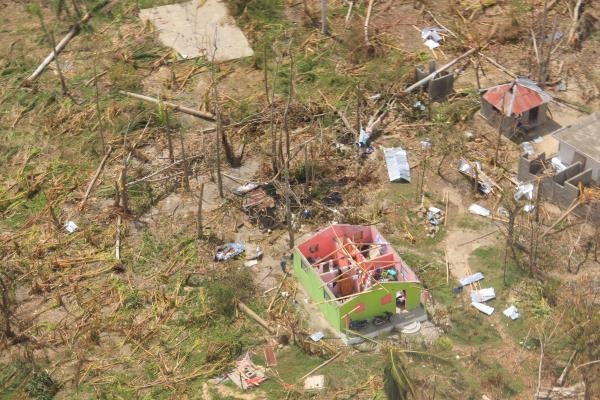
Joint CNSA/WFP/FAO news release
24 October 2016, Port-au-Prince/Rome - Some 1,4 million Haitians require food assistance in the wake of Hurricane Matthew, which wrought widespread devastation on supplies and crops across large swaths of the island nation. More than half, 800,000 people, are in dire need of immediate food aid, according to an emergency field assessment.
Conducted by the Government of Haiti, the National Coordination for Food Security (CNSA), the World Food Programme (WFP) and the Food and Agriculture Organization of the United Nations (FAO) the week after the hurricane, the assessment confirms the pressing need to provide immediate food assistance and help people to start rebuilding their livelihoods.
In the Department of Grande-Anse, agriculture has been virtually wiped out, warehouses have suffered serious damage, and the availability of local produce is now reduced to fruit fallen from trees. Around 50 percent of livestock were lost in some areas of the department.
On Haiti's southern coast, fishing activities are paralyzed due to nets, traps, boats and engines being washed away by flooding. As a result, income that families might use to buy food is nearly nonexistent. Meanwhile, losses of subsistence crops in the Department of Sud have been near total. Almost 90 percent of the department's forest and fruit trees were severely damaged; the remaining 10 percent are not likely to be productive this season.
"Local products on the markets will soon be depleted and we need more funding in order to continue food distributions to help 800,000 people in need of food aid which is more than urgent," said Miguel Barreto, WFP's Regional Director in Latin America and the Caribbean.
"The winter season crop is fast approaching. Agricultural producers have lost everything. If we don't act now to provide them with seed, fertilizer and other materials they need, they will not be able to plant and will be faced with persisting food insecurity," said Nathanaël Hishamunda, FAO's Representative in Haiti. He stressed the Organization's commitment to working together with the Ministry of Agriculture to implement its emergency response plan, focused on helping people resume agricultural activities and improving food security in rural areas.
Widespread impacts
Grande-Anse and Sud were not the only departments where food supplies and agriculture took a hit, the emergency evaluation shows.
In the Department of Nippes, the communities of Petit-Trou-de-Nippes, Baradères, Grand-Boucan, Plaisance-du-Sud, Asile, Petite-Rivière-de-Nippes have been severely affected, with almost 80 percent of their crops destroyed.
In the Department of Artibonite, the worst-hit town was Anse-Rouge but the four municipalities making up the District of Saint-Nicolas Mole (Bay of Henne, Bombardopolis, Jean Rabel, Mole Saint-Nicolas) were also affected. The hurricane destroyed from 60 to 90 percent of crops in this area, and livestock, a common activity in northwest Haiti, also registered substantial losses, with 60 to 80 percent of livestock wiped out.
Impacts to agriculture across the Department of Sud-Est were also widespread. Some 25 percent of maize crops are estimated to have been lost; between 60 and 90 percent of other crops have been damaged. Nearly 60 percent of fishing equipment was damaged or lost with trade-related losses estimated at around 40 percent.
The CNSA is calling for effective coordination of responses through strong institutional mechanisms, good monitoring and evaluation systems, and consultation in order to ensure consistency, transparency and efficiency.
The humanitarian community in Haiti urgently needs $56 million to meet the food assistance needs of people affected by Hurricane Matthew over the next three months.
# # #
About CNSA
CNSA is a state entity established in 1996 to guide public policies to sustainably improve the food security of the Haitian people. Specifically, CNSA undertakes the following tasks: defines, directs and harmonizes interventions by actors in the food security sector in Haiti; monitors and evaluates the national food security situation and the results of field programs and projects; disseminates information on the evolution of food security and forms opinions on the subject; translates policies and strategies into operational plans for food and nutrition security.
About WFP
WFP is the world's largest humanitarian agency fighting hunger worldwide, delivering food assistance in emergencies and working with communities to improve nutrition and build resilience. Each year, WFP assists some 80 million people in around 80 countries.
About FAO
FAO leads international efforts to defeat hunger. It helps countries modernize and improve agriculture, forestry and fisheries practices and ensure good nutrition for all. FAO focuses special attention on developing rural areas, home to 70 percent of the world's poor and hungry people. Present in Haiti since 1978, FAO supports the government through technical cooperation and agricultural development activities aimed at improving food security and the resilience of households.